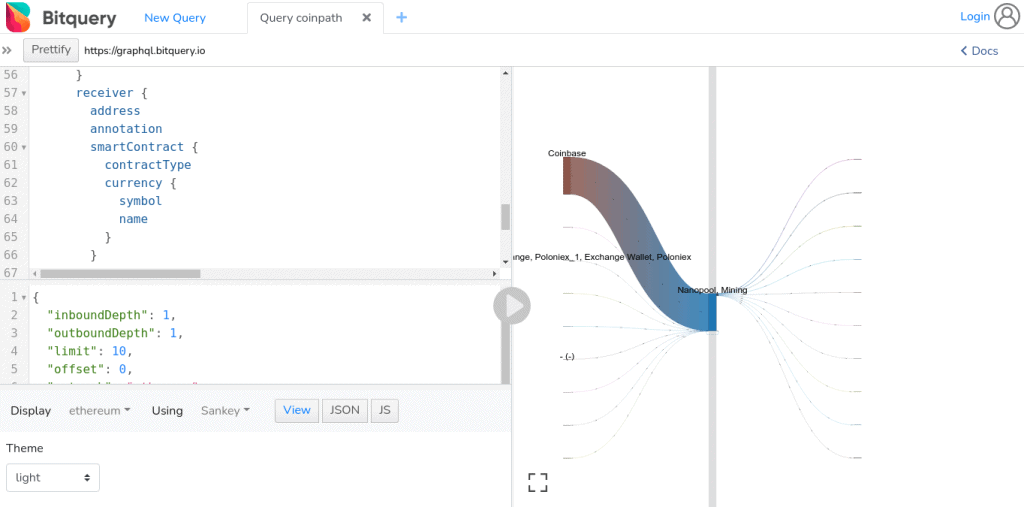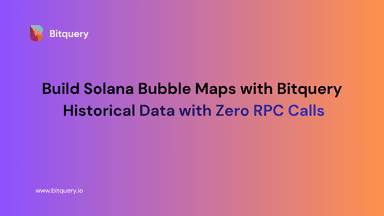
How to investigate an Ethereum address?
Recently, we saw a lot of researchers trying to uncover scams throughout the Ethereum ecosystems. However, we noticed that most of the researchers are able to explain “What happened” but not able to track “Who actually pulled the rug.”
We think this problem arises from the lack of sophisticated blockchain tracing tools available to the public. And it is a challenging task to trace the blockchain transactions using simple explorers.
Therefore, In this article, I will show how you can investigate blockchain addresses or transactions using Bitquery tools.
Note: In this article, we will show the Ethereum blockchain as an example; however, our tools support 40+ blockchains. Therefore, you can investigate addresses and transactions for all those blockchains.
Looking for end to end Crypto investigation tool? Explore Coinpath Moneyflow, built for investors and law enforcement agencies. Check it out here!
Visualizing an Ethereum address
In this article, we will take this Ethereum address (0x477573f212a7bdd5f7c12889bd1ad0aa44fb82aa) as an example and analyze it.
Associated addresses and Transactions
Bitquery explorer allows you to visualize transactions and addresses associated with a particular address. You can check money inflow and outflow, as shown in the following video.
You can also visualize the details on the associated addresses by double-clicking on those addresses, or you can open them in a separate tab by right-clicking on them.

As it is clearly visible, the given address interacted with a lot of exchanges. Therefore you can request those exchanges to get more details about the address.
In addition, we also provide some other details that can help identify the nature of the address, check all the tabs on the explorer.
Address Annotation
We annotate addresses everywhere, which helps you provide context. For example, you can see the latest transactions of the given address where we annotated the addresses of the receivers.

Go deep into the data
All data frames on Bitquery explorer are widgets powered by our GraphQL APIs. You can check the query showing the given data by clicking on the GraphQL button in the bottom right corner. You can also edit these queries based on your need and desired results.
If you don’t know about GraphQL, read our article to create your first GraphQL query.
Using Coinpath® APIs
Coinpath® is a set of blockchain money tracing APIs based on a sophisticated mathematical algorithm that can perform complex calculations between blockchain addresses to show the money flow. Coinpath® uses heuristics and machine learning to determine clusters, transaction flow, account balance, etc. Our Coinpath® APIs are the backbone of multiple blockchain investigation and compliance solutions.
Coinpath® is a set of API endpoints to trace money for any source and destination, create money flow graphs, and aggregate transfers to addresses. You can determine the origin and destination of money, transaction amount, and flow path.
Coinpath® depicts a clean data graph for money flow by analyzing wallet transactions and addresses and creates a clear path from funds’ origin to different crypto services and VASPs.

Outbound addresses received coins or tokens from ana address in a number of hops
This API gives you all the addresses which sent money to the given address over the number of hops. A hop is a transfer from one address to another address. We use heuristic and machine learning algorithms to provide accurate tracking of digital assets over the number of hops.
Our APIs are highly configurable, and you can customize the number of hops, tokens, and other parameters.
Inbound addresses received coins or tokens from ana address in a number of hops
This API gives you all the addresses which received money to the given address over the number of hops.
A combination of these two APIs will quickly provide your fund’s origin and destination and we also annotate address, which gives you the ability to identify exchanges, smart contracts, wallets, and other crypto services.
You can read more about Coinpath® APIs here and to visualize Coinpath data in more details see this video.
If you have any questions or need help with your blockchain investigation, just hop on our Telegram channel. Also, let us know if you are looking for blockchain data APIs.
You might also be interested in:
- Bitquery NFT Marketplace APIs: How to get NFT Data
- Understanding Wealth Distribution with Gini and Nakamoto Coefficients
- Building a Blockchain Intelligence System
- USDC vs USDT: Analyzing On-Chain Activities with the Token Holders API
About Coinpath®
Coinpath® APIs provide blockchain money flow analysis for more than 24 blockchains. With Coinpath’s APIs, you can monitor blockchain transactions, investigate crypto crimes such as bitcoin money laundering, and create crypto forensics tools.
If you have any questions about Coinpath®, ask them on our Telegram channel. Also, subscribe to our newsletter below, we will keep you updated with the latest in the cryptocurrency world.
Coinpath® is a Bitquery product. Bitquery is a set of tools that parse, index, access, search, and use information across blockchain networks in a unified way.
About Bitquery
Bitquery is a set of software tools that parse, index, access, search, and use information across blockchain networks in a unified way. Our products are:
-
Coinpath® APIs provide blockchain money flow analysis for more than 24 blockchains. With Coinpath’s APIs, you can monitor blockchain transactions, investigate crypto crimes such as bitcoin money laundering, and create crypto forensics tools. Read this to get started with Coinpath®.
-
Digital Assets API provides index information related to all major cryptocurrencies, coins, and tokens.
-
DEX API provides real-time deposits and transactions, trades, and other related data on different DEX protocols like Uniswap, Kyber Network, Airswap, Matching Network, etc.
If you have any questions about our products, ask them on our Telegram channel. Also, subscribe to our newsletter below, we will keep you updated with the latest in the cryptocurrency world.
Subscribe to our newsletter
Subscribe and never miss any updates related to our APIs, new developments & latest news etc. Our newsletter is sent once a week on Monday.




